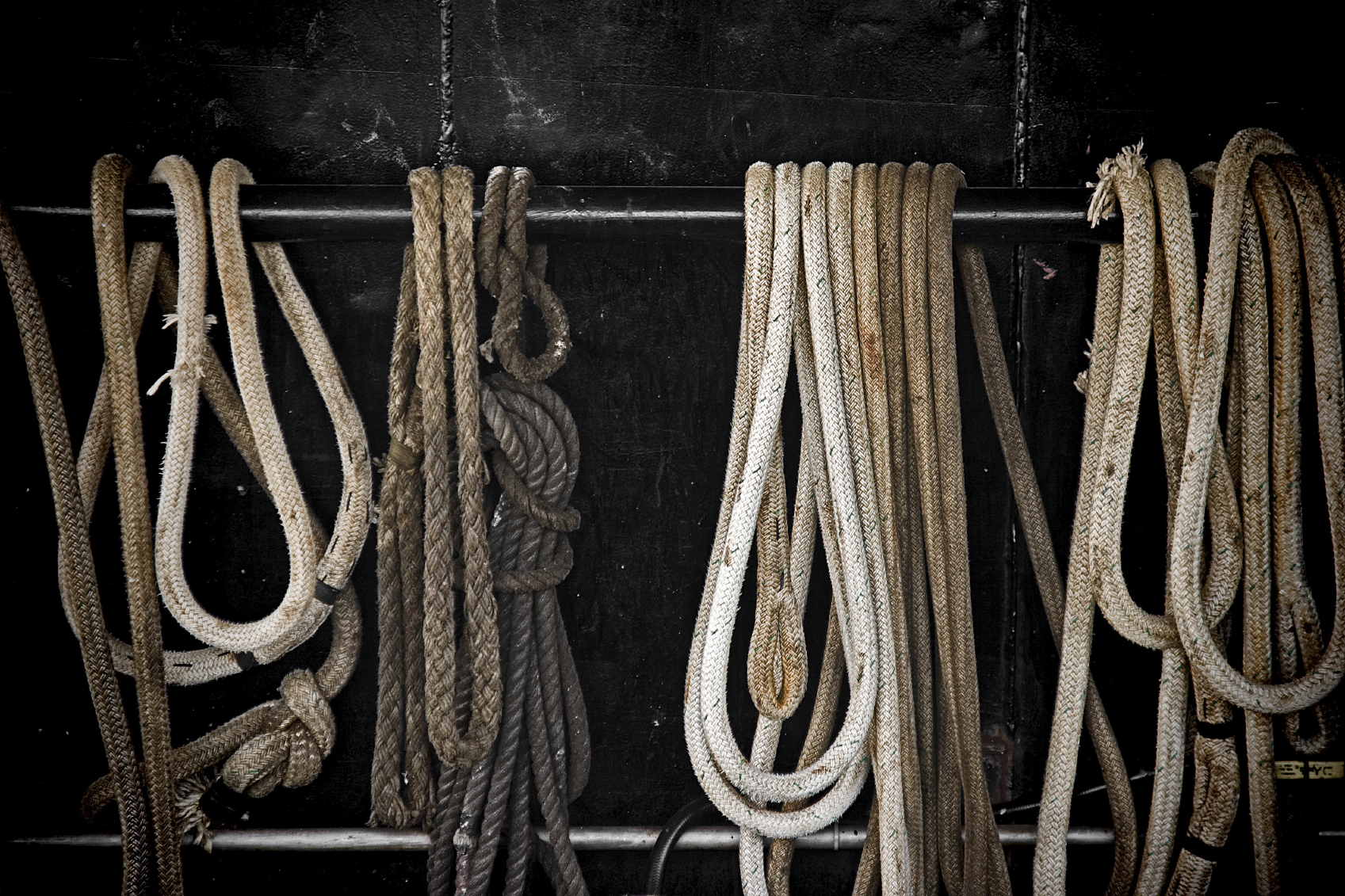The forgotten origins of 9 common clichés
It's time you stopped gathering wool and got to know the ropes of these tired phrases


A free daily email with the biggest news stories of the day – and the best features from TheWeek.com
You are now subscribed
Your newsletter sign-up was successful
Idioms and clichés add a touch of color to our conversation. Many of them make immediate sense, like "trying to find a needle in a haystack" or "fresh as a daisy." But others, if you examine them closely, appear to be nonsense. For most of those old sayings, the key word is "old." If we look far enough back in history, we can learn how exactly one can be "pleased as punch" or "just a flash in the pan." Here are nine clichés that stem from forgotten everyday life:
1. "I like the cut of your jib, young man."
Means: To appreciate the unique nature of a person.
The Week
Escape your echo chamber. Get the facts behind the news, plus analysis from multiple perspectives.

Sign up for The Week's Free Newsletters
From our morning news briefing to a weekly Good News Newsletter, get the best of The Week delivered directly to your inbox.
From our morning news briefing to a weekly Good News Newsletter, get the best of The Week delivered directly to your inbox.
So many of our colloquialisms come from the sea. A "jib" is a triangular staysail that sets ahead of the foremast of a sailing vessel. Back when the world was controlled by its seas, a good sailor could tell the nationality, and possibly the intentions, of an approaching ship by the particular cut and shape of its jib. It entered English as a description of someone's character in the early 1820s.
2. "Up to your old hi-jinks again, are you?"
Means: Spirited tricks and mischief.
"High Jinks" was a silly party game played at fashionable gatherings in centuries past. There were many variations of the game, but at its core, players threw dice, and whoever's number came up had to pretend to be a fictitious character, or animal, or whatever the company thought would be most embarrassing, for the entertainment of his friends. Or they had to recite verses (memorization played a much larger part in education in previous eras) in whichever order their friends demanded. If you fumbled your lines or couldn't keep up your "Aristocratic Goat" impersonation any longer, you had to take a shot of alcohol, or a pay a fine.
A free daily email with the biggest news stories of the day – and the best features from TheWeek.com
3. "I totally got read the riot act."
Means: Get yelled at for misbehaving.
Whatever riot act a modern parent has to read is probably better than the original one, decreed in 1716 by George I of England. That Riot Act was meant to be read loudly whenever more than 12 people were assembled and causing disruption. It went along the lines of, "Our Sovereign Lord the King chargeth and commandeth all persons being assembled immediately to disperse themselves, and peaceably depart to their inhabitations…." And so forth, before ending with a resounding "God Save the King!" And, much like a teenager of today, the punishment for ignoring the Riot Act was to be grounded. Sometimes for life, with hard labor.
4. "Focus! Stop gathering wool."
Means: To daydream, to wander aimlessly in thought.
As any rancher will tell you, shearing wool is intense and physical; anything but leisurely and aimless. Even in an age of electrical shearers, capturing, subduing, and cleanly removing quality fiber from an animal is a huge challenge. That's not the job wool-gathering refers to. As any rancher can also tell you, animals have a tendency to rub out itches against trees, fences, and bushes. They often leave a good amount of their fiber (far more valuable in the past, when nearly all cloth was made from it) caught on those surfaces. A wool-gatherer was a gleaner, wandering through rural areas looking for whatever small thatches of wool they might find left behind. The hope was to gather enough to use or sell.
5. "I'll help you out until you get to know the ropes."
Means: Learn how to handle the job, understand details.
Some say this phrase originates in horse racing, as a capable jockey would "know the ropes (reins)" of a winning horse. But most etymologists agree this word must have had a nautical beginning. Knowing the ropes of the sailing vessels of centuries past wasn't a metaphor. Everything was controlled by an endless system of ropes, pulleys, and intricate knots. It would take a new crew member time and a lot of instruction before he learned to master all the parts of his job that pertained to "the ropes."
6. "Happy? I'm just pleased as punch for you!"
Means: To be proud, delighted.
In nearly every period drama, if there is a scene of a market or fair, there will also be an audience of children gathered around a puppet booth. They are watching Punch and Judy. It was a never-ending story of the lovable but naughty scamp Punch (from his 16th century Italian origin Pulcinello), his miserable shrew-wife Joan (or Judy as years went on), and a cast of characters that expanded over the centuries. Punch would hatch some scheme, his wife would beat him with a stick, then Punch might fight the Devil (he did this very often, to add morality to the performance) and then beat his wife with the stick (which was acceptable to theatergoers of that era). But in the end, Punch would always come out victorious, filled with pride, and oblivious to the mayhem he had caused. Pleased as Punch.
7. "I'm going to get raked over the coals for this report."
Means: Severely reprimanded.
Especially if your report was written in the 16th century, and said bad things about the Catholic Church. Because then it would be considered heresy, and it was punishable by death. Specifically, death by burning. Or, a literal dragging back and forth across burning coals — a method to help heretics recant their beliefs and return to the one true Church.
8. "That singer had no real lasting talent; just a flash in the pan."
Means: One brief burst of seeming success.
I can't be the only person who has always had a vague picturing of a grease fire exploding in a kitchen when hearing this phrase. But it has nothing to do with cookware. The "pan" actually belonged to old flintlock guns, and the flash that came from it was meant to ignite a charge to propel the bullet (or ball) out of the barrel. The guns were unreliable; you often got a spark (flash in the pan) without launching any projectiles. By 1810 "flash in the pan" meant an explosion that fell flat.
9. "He's going to call me after he proposes. I'm on tenterhooks!"
Means: In almost painful suspense.
First of all, it's a surprise to learn the expression is not "tenderhooks," which somehow made more sense, as it more easily called to mind something a butcher would hang meat from. Rather "tenterhooks" were hooks on a large wooden frame, called a tenter. A tenter was used for centuries by wool manufacturers to stretch their wet fabric out to dry and shape flat. The hooks kept the material in place. Many etymologists believe that the images of hooks and stretching helped give the word its modern meaning. Though "tenters" were used in poetry as early as 1633 to describe emotional states, as in John Ford's 17th century play Broken Heart: Passion, O, be contained. My very heart strings Are on the Tenters.
Therese O'Neill lives in Oregon and writes for The Atlantic, Mental Floss, Jezebel, and more. She is the author of New York Times bestseller Unmentionable: The Victorian Ladies Guide to Sex, Marriage and Manners. Meet her at writerthereseoneill.com.
-
 Britain’s ex-Prince Andrew arrested over Epstein ties
Britain’s ex-Prince Andrew arrested over Epstein tiesSpeed Read The younger brother of King Charles III has not yet been charged
-
 Political cartoons for February 20
Political cartoons for February 20Cartoons Friday’s political cartoons include just the ice, winter games, and more
-
 Sepsis ‘breakthrough’: the world’s first targeted treatment?
Sepsis ‘breakthrough’: the world’s first targeted treatment?The Explainer New drug could reverse effects of sepsis, rather than trying to treat infection with antibiotics
